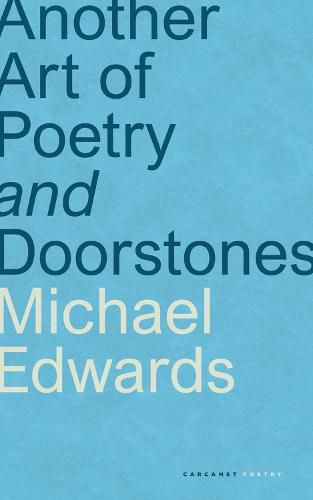Readings Newsletter
Become a Readings Member to make your shopping experience even easier.
Sign in or sign up for free!
You’re not far away from qualifying for FREE standard shipping within Australia
You’ve qualified for FREE standard shipping within Australia
The cart is loading…






Michael Edwards returned to the English tongue for his last book of poems, At the Brasserie Lipp (2019), after years as a French-language author. English revived many nerves of memory, and in Another Art of Poetry he explores them further, in ten chapters, each consisting of continuously numbered sections. There are 194 sections, so we can read the book as a continuous sequence, as ten discrete poems, or as single lyrics and epistles interspersed.
There is something Augustan about the approach, humorous, alert, like a series of letters and reflections spoken to us. The formal variety of the sections reminds us how well Edwards knows his Eliot, Williams, Pound, his David Jones; he understands modernism and the other resources that inform the grateful poets who value our European and wider traditions. ('The godsend of influence.') Originality has to do with origins. 'Everything has been said,' he begins, 'and we come / just at the right moment.'
His English re-visions once familiar landscapes in Wivenhoe, in Paris and elsewhere; it finds his antecedents, it restores access to belief and transcendence. Doorstones, an additional full collection, bridges the gap between At the Brasserie Lipp and this ars poetica.
$9.00 standard shipping within Australia
FREE standard shipping within Australia for orders over $100.00
Express & International shipping calculated at checkout
Michael Edwards returned to the English tongue for his last book of poems, At the Brasserie Lipp (2019), after years as a French-language author. English revived many nerves of memory, and in Another Art of Poetry he explores them further, in ten chapters, each consisting of continuously numbered sections. There are 194 sections, so we can read the book as a continuous sequence, as ten discrete poems, or as single lyrics and epistles interspersed.
There is something Augustan about the approach, humorous, alert, like a series of letters and reflections spoken to us. The formal variety of the sections reminds us how well Edwards knows his Eliot, Williams, Pound, his David Jones; he understands modernism and the other resources that inform the grateful poets who value our European and wider traditions. ('The godsend of influence.') Originality has to do with origins. 'Everything has been said,' he begins, 'and we come / just at the right moment.'
His English re-visions once familiar landscapes in Wivenhoe, in Paris and elsewhere; it finds his antecedents, it restores access to belief and transcendence. Doorstones, an additional full collection, bridges the gap between At the Brasserie Lipp and this ars poetica.